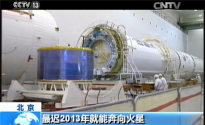It's predicted to enter Mars' orbit by February 10I didn't know Tianwen-1 Mars Probe is already so near to Mars.
You are using an out of date browser. It may not display this or other websites correctly.
You should upgrade or use an alternative browser.
You should upgrade or use an alternative browser.
China's Space Program News Thread
- Thread starter crazyinsane105
- Start date
- Status
- Not open for further replies.
China urged by scientists to create biggest radar system to save lives threatened by asteroid strike
- Chinese scientists and military researchers outline plan for several radio dishes as ‘responsibility to mankind’
- Relying on the US to tell of a potential catastrophe is no longer an option, say researchers
"Continuing to rely solely on information provided by the Americans for a threat that could cause a global catastrophe would have a negative impact on China’s rising status in the international community, the researchers said."
"The US had two planetary radars but one of them – the Arecibo Observatory in Puerto Rico – collapsed in December because of ageing, hurricane damage and a shortage of funding for repair and maintenance. This leaves the Goldstone Solar System Radar in a Californian desert as the last line of defence, and things could go wrong."
"Continuing to rely solely on information provided by the Americans for a threat that could cause a global catastrophe would have a negative impact on China’s rising status in the international community, the researchers said."
This is going to be a contrarian post. Fair warning.
No, I am not advocating for the US to be the ones to have the only space guardian role.
However, the evidence from the asteroid mapping efforts from the last 25 years has shown the probability of anything really big hitting the earth as being really, really small. While the knowledge is awesome, the effort - in retrospect - has been something of a boondoggle. Without additional resources, it is looking like we'll have everything Chelyabinsk meteor in size and smaller within 10 years. very, very few are anything close to 'scary.'
The questions to ask are...is this a good idea to spend lots of money on? It wouldn't hurt: Arecibo is crunched and a replacement ought to be brought online. But...didn't China just build a more modern, Arecibo like telescope? What stops that from filling the same role?
And the real mapping efforts have been through using IR telescopes in orbit. NEOWISE, etc. have provided most of the data where the 'roids are orbiting, not the radar systems.
I am always an advocate for more radio telescopes. The stupidity of the US government for not pursuing science for the last 30 years has been ridiculous. China ought to go and build what I call the RLA (ridiculously large array) in western China. However, science has moved on about the asteroid threat and advocating using the asteroid threat is has become a silly trope. Just like lunar He3.
An aside, water coming to the Earth from comets during Earth's formation has become another silly science trope as well, but neither here nor there. The water was there from the very first of its formation. The Theia Impact probably reduced the water content of the Earth and greatly reduced the density of the atmosphere. That's getting off topic though.
This is going to be a contrarian post. Fair warning.
No, I am not advocating for the US to be the ones to have the only space guardian role.
However, the evidence from the asteroid mapping efforts from the last 25 years has shown the probability of anything really big hitting the earth as being really, really small. While the knowledge is awesome, the effort - in retrospect - has been something of a boondoggle. Without additional resources, it is looking like we'll have everything Chelyabinsk meteor in size and smaller within 10 years. very, very few are anything close to 'scary.'
The questions to ask are...is this a good idea to spend lots of money on? It wouldn't hurt: Arecibo is crunched and a replacement ought to be brought online. But...didn't China just build a more modern, Arecibo like telescope? What stops that from filling the same role?
And the real mapping efforts have been through using IR telescopes in orbit. NEOWISE, etc. have provided most of the data where the 'roids are orbiting, not the radar systems.
I am always an advocate for more radio telescopes. The stupidity of the US government for not pursuing science for the last 30 years has been ridiculous. China ought to go and build what I call the RLA (ridiculously large array) in western China. However, science has moved on about the asteroid threat and advocating using the asteroid threat is has become a silly trope. Just like lunar He3.
An aside, water coming to the Earth from comets during Earth's formation has become another silly science trope as well, but neither here nor there. The water was there from the very first of its formation. The Theia Impact probably reduced the water content of the Earth and greatly reduced the density of the atmosphere. That's getting off topic though.
You have to fight for funding and 'it's good science' is often not good enough. It either has to have economic or strategic benefits. Also China's Ministry of Finance (who draws the central government budget) was famously anti-space.
Here are screenshots from a 2020 interview with Ye Peijian, the chief designer of China Lunar Exploration Program:




Chinese scientists and engineers began to plan for Mars exploration in 2007 and the original plan was for a mission date no later than 2013. But it kept getting delayed because they couldn't get approval from the bureaucrats. Minor functionaries at the Ministry of Finance would ask "Why do you want to go to the Moon?" "How much GDP growth can moon exploration contribute?"
The situation only got better after Xi Jinping issued a directive in 2019 to the Ministry of Finance to give the space program adequate funding. After Xi had spoken, the Minister of Finance went to CALT in person to pledge support.
Is this about the moon or mars exploration? or about the space program in general?Chinese scientists and engineers began to plan for Mars exploration in 2007 and the original plan was for a mission date no later than 2013. But it kept getting delayed because they couldn't get approval from the bureaucrats. Minor functionaries at the Ministry of Finance would ask "Why do you want to go to the Moon?" "How much GDP growth can moon exploration contribute?"
Is this about the moon or mars exploration? or about the space program in general?
I was translating the interview. I think Ye Peijian was making a point about MoF’s aversion to space in general,
antiterror13
Brigadier
Found this article doing a quick google search - 9 billion USD in 2020 apparently, second to the US (48 billion).
gooosh, so China spends less than 20% of the US budget and it seems China achieving much more than the US
China urged by scientists to create biggest radar system to save lives threatened by asteroid strike
- Chinese scientists and military researchers outline plan for several radio dishes as ‘responsibility to mankind’
- Relying on the US to tell of a potential catastrophe is no longer an option, say researchers
"Continuing to rely solely on information provided by the Americans for a threat that could cause a global catastrophe would have a negative impact on China’s rising status in the international community, the researchers said."
"The US had two planetary radars but one of them – the Arecibo Observatory in Puerto Rico – collapsed in December because of ageing, hurricane damage and a shortage of funding for repair and maintenance. This leaves the Goldstone Solar System Radar in a Californian desert as the last line of defence, and things could go wrong."
Love the attitude. Hope it goes on and becomes a reality. This equipment can be used for much much more than asteroid warning anyway.
This is going to be a contrarian post. Fair warning.
No, I am not advocating for the US to be the ones to have the only space guardian role.
However, the evidence from the asteroid mapping efforts from the last 25 years has shown the probability of anything really big hitting the earth as being really, really small. While the knowledge is awesome, the effort - in retrospect - has been something of a boondoggle. Without additional resources, it is looking like we'll have everything Chelyabinsk meteor in size and smaller within 10 years. very, very few are anything close to 'scary.'
The questions to ask are...is this a good idea to spend lots of money on? It wouldn't hurt: Arecibo is crunched and a replacement ought to be brought online. But...didn't China just build a more modern, Arecibo like telescope? What stops that from filling the same role?
And the real mapping efforts have been through using IR telescopes in orbit. NEOWISE, etc. have provided most of the data where the 'roids are orbiting, not the radar systems.
...
Well if you think about events like Tunguska it's only because of sheer luck something bigger hasn't happened. Most of the Earth's surface is oceans so most of the time asteroids fall into the ocean. But I don't think it's a bad idea to have at least a warning system available.
As for why the new Chinese radio telescope can't be used, I think I remember hearing it can't do active radar, i.e. it only receives signals it can't emit signals, and that's why it can't do radar astronomy for asteroids.
Well if you think about events like Tunguska it's only because of sheer luck something bigger hasn't happened. Most of the Earth's surface is oceans so most of the time asteroids fall into the ocean. But I don't think it's a bad idea to have at least a warning system available.
Luck as it is statistically unlikely to. Consider through all of human history, how many massive impacts have there been? After examining the orbits, there are extremely few if any candidates for Tungska like events. None of like what happened at Chicxulub. As of right now, the only things we don't have a good idea on are the ones the size of the Chelyabinsk meteor are about all that's left. To find. And, again, it's IR scanning telescopes doing the finding, not the radar systems.
As for why the new Chinese radio telescope can't be used, I think I remember hearing it can't do active radar, i.e. it only receives signals it can't emit signals, and that's why it can't do radar astronomy for asteroids.
I would be very surprised (and disappointed) if China left out the ability to transmit on the new radio telescope.
- Status
- Not open for further replies.
